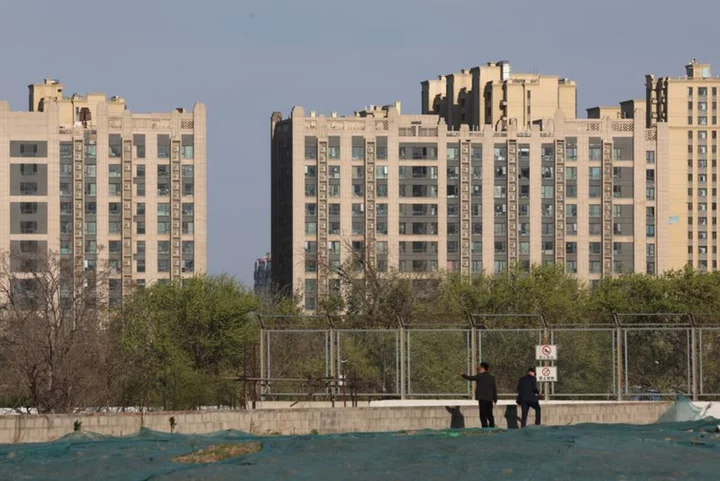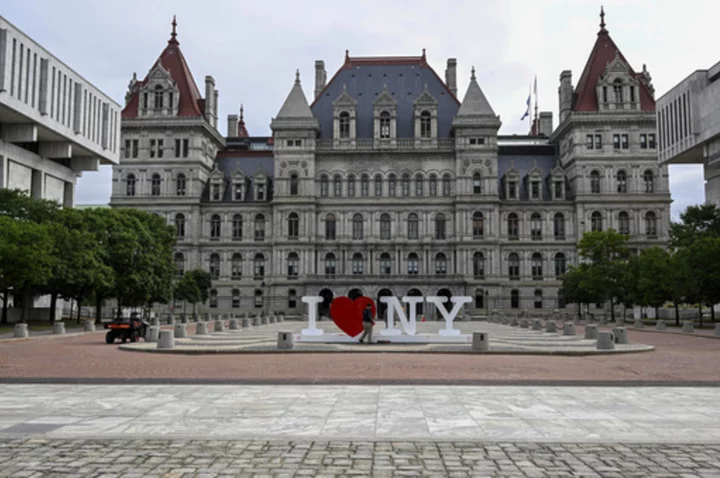By Laura Sanicola
(Reuters) -Oil prices fell on Thursday after rising by more than 1% earlier in the session after OPEC+ oil producers agreed to voluntary output cuts approaching 2 million barrels per day (bpd) for early next year, with each country announcing separately its voluntary cut.
Brent crude futures for January fell by 28 cents, or 0.3%, to $82.82 a barrel by 12:30 p.m. EDT (1730 GMT). The front-month Brent contract, down about 6% on the month, expires later on Thursday.
The more liquid February contract was down $2.05, or 2.5%, at $83.83.
U.S. West Texas Intermediate crude futures fell by $2.00, or 2.5%, to $75.86, and is down about 9% on the month.
Brent's premium to U.S. WTI futures hit its highest since January in the session.
Saudi Arabia, Russia and other members of OPEC+, who pump more than 40% of the world's oil, held a virtual meeting on Thursday to discuss 2024 output amid concerns the market faces a potential surplus.
OPEC+ said the latest agreement would involve cuts approaching 2 million bpd, including Saudi Arabia extending a voluntary cut of 1 million bpd it has had in place since July.
Their output of some 43 million bpd already reflects cuts of about 5 million bpd aimed at supporting prices and stabilising the market.
The additional OPEC+ cuts for the first quarter of 2024 are set to be voluntary, a delegate said. Each country will announce separately its voluntary cut, according to a source familiar with the matter.
But there is a large degree of skepticism on how individual OPEC members will reach those cuts, according to Bob Yawger, director of energy futures at Mizuho.
"This is a very sketchy report - there is a huge question of their credibility in how these cuts will happen," Yawger said, adding that the UAE is supposed to be increasing production by 200,000 bpd by 2024.
Nigeria has been given a 2024 output quota of 1.5 million barrels per day (bpd), Angola 1.11 million bpd and Congo 0.277 million bpd, a draft statement from OPEC+ seen by Reuters showed.
Russia agreed to output cuts in the first quarter of 2024 of 500,000 bpd, according to Russia's deputy prime minister. Algeria will cut output by 51,000 bpd, Kazakhstan will cut by 82,000 bpd, Oman will cut by 42,000 bpd and Kuwait will cut by 135,000 bpd, according to various country officials.
OPEC+ oil-producing countries meeting on Thursday to discuss 2024 output levels will convene again next June on 2024 output levels.
The meeting, being held on the same day as global leaders gather in Dubai for the U.N. climate conference, was originally scheduled for last week but was deferred because of disagreements over output quotas for African producers.
The OPEC+ Joint Ministerial Monitoring Committee (JMMC) ended its meeting on Thursday without making a recommendation regarding 2024 output levels, three delegates told Reuters.
The committee met ahead of the wider meeting of ministers from the OPEC+ group of oil-producing nations.
Implementing additional cuts will send prices higher in the immediate future, but the long-term impact is harder to predict, said Tamas Varga of oil broker PVM.
Compliance will be an issue and the global oil balance is probably much less tight than OPEC estimates, he said, citing the latest commercial inventory data out of the United States and the effect on demand from stubbornly high interest rates in many major economies.
U.S. crude production in September rose 1.7% to a monthly record of 13.24 million barrels per day, the Energy Information Administration said on Thursday.
Crude production in Texas fell by 0.1% to 5.57 million bpd, the lowest since July and the first time production in the state has fallen since April, the EIA said.
(Reporting by Laura Sanicola in Washington, Robert Harvey and Natalie Grover in London and Jeslyn Lerh in SingaporeAdditional reporting by Laura Sanicola in WashingtonEditing by David Goodman, Kirsten Donovan and Lisa Shumaker)









